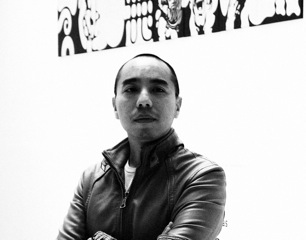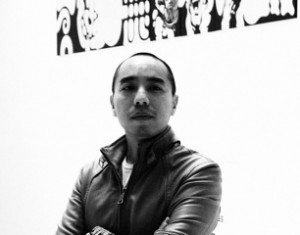Mekong Hotel: Interview with Apichatpong Weerasethakul

Why was it important for you to get back to the area where you shot Uncle Boonmee?
Apichatpong Weerasethakul: It is my home; this is where I grew up. Although I didn’t know much about the area’s history back then, it is [a] very interesting thing to discover it now. My latest installation is about the communist period in this area, about Laos people re-locating. Also, when my dad died in 2003, we threw his ashes into the river. When the water dries up, you can see a lot of bulldozers digging up the sand and using it for constructions, so people’s bones and ashes end up being parts of new buildings. This idea of reincarnation is interesting to explore.
With all the building work taking place, does the region change quickly?
Yes, the change is very rapid, especially in the relationship between people and the river, and Laotians and Thais. There is, for example, a hydro-electric dam being built in China, and one in Laos as well, and it affects the biodiversity of [the] river’s flora and fauna. Sometimes it causes floods as well, other times the river dries up… Yet I feel Thailand needs more of these electric-cities; we buy a lot of our electricity from Laos, the balance is thrown off.
Do you have the feeling that cities in Asia are physically changing faster than the society manages to adapt to them?
I do. If you look at European capitals – London, Paris – they haven’t changed much in the past ten years. But I return to my hometown after ten years, and it is completely different. I don’t feel good about it – cities lose character, they become similar all over the world.
How is the experience of making this particular film different from your previous ones?
This movie is very organic because it is a small production, so I had quite a lot of freedom. Usually when we make a movie we stay in the hotel and shoot at some other location; while during this shoot we decided to live, eat, and film all in the same place.
This film has got a lot more soundtrack than your other works. How did this decision come about?
I met up with Chai Bhatana, a high school friend of mine whom I hadn’t seen for 20 years, and found out that he had become a guitar teacher. The film was a good chance to catch up with him. I gave him a treatment of the vampire story I was working on, and he interpreted it and composed some melodies which I later recorded. But for me, when it comes to soundtrack, if I want to use it – I must put all of it in the film, so that it becomes a portrait of the musician as well. Working with music is very new to me, and the whole idea of ‘soundtrack’ in this film basically consists of me working with Chai trying to get it right, so I wanted to have this collaboration represented as well.
Why do you always work with the same actors, like Sakda and Jenjira? What made you choose them in particular?
Filmmaking for me is capturing people I love – we grow old together, through movies. They are my family now. I have the real genetic family, and I have my film making family. It also consists of people behind the camera, like the sound man. Everything is personal. I don’t make movies about car crashes or explosions, because I have never experienced that. I only talk about things I have experienced.
So you see yourself continuing to work with the same cast and crew in the future?
Yes, I will continue capturing their lives. Sakda, for example, has moved to Montpellier recently, to live with his new boyfriend, and I am already wondering if I can capture the change in him, this new life he started.
Why are you so fascinated with ghosts, magical and supernatural creatures?
I think it’s because of my fascination with memories – I try to explore how we remember things. Ghosts had a very strong presence for me while growing up. I think I did believe in ghosts – they were real for me. And now, when I grew up, it became fiction. The change in perception of what is reality and what is fiction is very interesting to me, especially in the medium of cinema, which is all about creating illusion. But I am at the same time very conscious about my illusions – I know they appear comical. Yet within Thai culture, which is a mix of animism, Buddhism and Hinduism, the belief in [the] supernatural is very prevalent – we grow up believing that everything has a spirit. Now, of course, I know that this is nonsense, but I still cannot get it out of my head – I think in that way from time to time, it is implanted. And it is all over the press in Thailand as well – for example, when the new prime minister was elected, the picture of her praying to the spirit on the roof-top of the parliament was printed in the newspapers the next day, and nobody finds it weird or questionable. But I believe that some day science will reach a point where there is no more mystery, and be able to prove that spirits do not exist – humans are only living robots, if you think about it.
You use fiction to explain our reality, to make people more aware of it. But the fairytale quality, the supernatural nature of your stories might mask the political message within them. Do you think people recognise this message? To what extent do you see yourself as a political filmmaker?
I think these days we can only communicate through using fiction, because this is how we have grown up – consuming moving images. Our generation thinks cinematically. When we remember, when we dream, it is also like a movie – we remember stories in close-ups, in slow motion. So yes, film is a very powerful medium to convey reality, and especially the political situation, when you cannot say it in the country with a strong censorship – you have to think of more creative ways to get the message across. However, my movies are not overtly political – I touch upon politics only in order to trigger people’s curiosity, make them want to google and find out what really happened in our history. My films are very personal; I primarily make them to reflect myself. But as I grow older, my interests start to lean towards the political – the political then becomes personal, and I can make a film about that. I find it strange when young people really want to make political movies, I think, “Please, don’t do that, you’re obsessed with sex and other things now.” As you grow older it all comes naturally, and I do try to reflect that myself with my work.
Do you see yourself as still naïve to some extent, possessing some sort of child-like curiosity towards the world, like some of your characters do?
No, I don’t think so. I travel a lot, and I cannot help but compare the way things work in various countries with the situation in Thailand. However, now I see that in third world countries’ educational systems, the history that I was taught was very distorted. So I find myself being 42 and with the help of movies and the Internet still learning to this day about what really happened.
Thank you very much for your time and your thoughts, enjoy the rest of your Cannes!
Ruta Buciunaite
Apichatpong’s newest feature Mekong Hotel has been screened in the Special Screenings program, and his short film Ashes, shot entirely with LomoKino camera, premiered in Cannes Short Film program.
























Facebook
Twitter
Instagram
YouTube
RSS